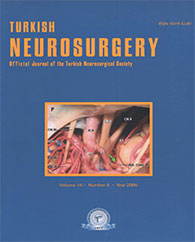5Department of Forensic Medicine, Istanbul Medical Faculty, Istanbul, Turkey
6Council of Forensic Medicine, Istanbul, Turkey OBJECTIVE: The objective of the present study is to display the significance of early intervention in large vessel injury associated with surgery of herniated lumbar disc and demonstrate how the complications of vessel injuries are evaluated by medical experts.
METHODS: Our study was based on a retrospective review of the six cases which were claimed to be associated with large vessel injuries defined as lifethreatening complications during herniated disc surgery among 40 neurosurgical cases presented to the Third Special Board comprising medical experts for medical malpractice in the Institute of Forensic Medicine between 1998 and 2005.
RESULTS: The courts referred these six cases to the Institute of Forensic Medicine in order to determine whether the neurosurgeons performing the surgery were negligent in the intraoperative large vessel injuries of herniated disc. The pertinent Special Board of the Institute of Forensic Medicine (IFM) decided that the practice in five of the six cases was not within the range of medically permitted risk, and the neurosurgeon was negligent while no negligence was found in one case.
CONCLUSIONS: It is essential for neurosurgeons to always keep in mind that early intervention saves lives when such complications arise and fully inform the patient or the legal representatives about the risk associated with the treatment before the intervention and obtain their informed consent in writing. In case of a medical malpractice which is not included in the medical risks accepted by the medical science of neurosurgery, it is inevitable that the surgeon will be found negligent in spite of the presence of an informed consent.
Keywords : Neurosurgery, Vessel Injury, Medical Malpractice, Forensic Medicine




